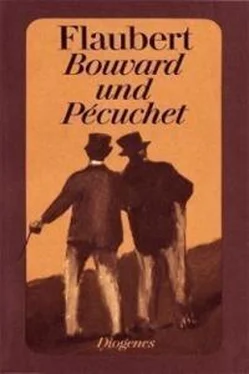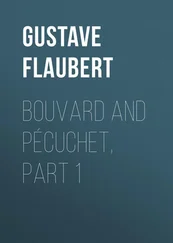"Enough! enough!" he cried.
"A little patience!" Bouvard kept repeating.
Pécuchet tapped more quickly on the glass plates, and the instrument was vibrating in the midst of the poor man's cries when the doctor appeared, attracted by the hubbub.
"What! you again?" he exclaimed, enraged at finding them always with his patients.
They explained their magnetic method of curing. Then he declaimed against magnetism—"a heap of juggleries, whose effects came only from the imagination."
However, animals are magnetised. Montacabère so states, and M. Fontaine succeeded in magnetising a lion. They had not a lion, but chance had offered them another animal.
For on the following day a ploughboy came to inform them that they were wanted up at the farm for a cow in a hopeless condition.
They hurried thither. The apple trees were in bloom, and the herbage in the farmyard was steaming under the rays of the rising sun.
At the side of a pond, half covered with a cloth, a cow was lowing, while she shivered under the pails of water that were being emptied over her body, and, enormously swollen, she looked like a hippopotamus.
Without doubt she had got "venom" while grazing amid the clover. Père Gouy and his wife were afflicted because the veterinary surgeon was not able to come, and the wheelwright who had a charm against swelling did not choose to put himself out of his way; but "these gentlemen, whose library was famous, must know the secret."
Having tucked up their sleeves, they placed themselves one in front of the horns, the other at the rump, and, with great internal efforts and frantic gesticulations, they spread wide their fingers in order to scatter streams of fluid over the animal, while the farmer, his wife, their son, and the neighbours regarded them almost with terror.
The rumblings which were heard in the cow's belly caused borborygms in the interior of her bowels. She emitted wind.
Pécuchet thereupon said: "This is an opening door for hope—an outlet, perhaps."
The outlet produced its effect: the hope gushed forth in a bundle of yellow stuff, bursting with the force of a shell. The hide got loose; the cow got rid of her swelling. An hour later there was no longer any sign of it.
This was certainly not the result of imagination. Therefore the fluid contained some special virtue. It lets itself be shut up in the objects to whom it is given without being impaired. Such an expedient saves displacements. They adopted it; and they sent their clients magnetised tokens, magnetised handkerchiefs, magnetised water, and magnetised bread.
Then, continuing their studies, they abandoned the passes for the system of Puységur, which replaces the magnetiser by means of an old tree, about the trunk of which a cord is rolled.
A pear tree in their fruit garden seemed made expressly for the purpose. They prepared it by vigorously encircling it with many pressures. A bench was placed underneath. Their clients sat in a row, and the results obtained there were so marvellous that, in order to get the better of Vaucorbeil, they invited him to a séance along with the leading personages of the locality.
Not one failed to attend. Germaine received them in the breakfast–room, making excuses on behalf of her masters, who would join them presently.
From time to time they heard the bell ringing. It was the patients whom she was bringing in by another way. The guests nudged one another, drawing attention to the windows covered with dust, the stains on the panels, the frayed pictures; and the garden, too, was in a wretched state. Dead wood everywhere! The orchard was barricaded with two sticks thrust into a gap in the wall.
Pécuchet made his appearance. "At your service, gentlemen."
And they saw at the end of the garden, under the Edouïn pear tree, a number of persons seated.
Chamberlan, clean–shaven like a priest, in a short cassock of lasting, with a leathern cap, gave himself up to the shivering sensations engendered by the pains in his ribs. Migraine, whose stomach was always tormenting him, made wry faces close beside him. Mère Varin, to hide her tumour, wore a shawl with many folds. Père Lemoine, his feet stockingless in his old shoes, had his crutches under his knees; and La Barbée, who wore her Sunday clothes, looked exceedingly pale.
At the opposite side of the tree were other persons. A woman with an albino type of countenance was sponging the suppurating glands of her neck; a little girl's face half disappeared under her blue glasses; an old man, whose spine was deformed by a contraction, with his involuntary movements knocked against Marcel, a sort of idiot clad in a tattered blouse and a patched pair of trousers. His hare–lip, badly stitched, allowed his incisors to be seen, and his jaw, which was swollen by an enormous inflammation, was muffled up in linen.
They were all holding in their hands pieces of twine that hung down from the tree. The birds were singing, and the air was impregnated with the refreshing smell of grass. The sun played with the branches, and the ground was smooth as moss.
Meanwhile, instead of going to sleep, the subjects of the experiment were straining their eyes.
"Up to the present," said Foureau, "it is not funny. Begin. I am going away for a minute."
And he came back smoking an Abd–el–Kader, the last that was left from the gate with the pipes.
Pécuchet recalled to mind an admirable method of magnetising. He put into his mouth the noses of all the patients in succession, and inhaled their breath, in order to attract the electricity to himself; and at the same time Bouvard clasped the tree, with the object of augmenting the fluid.
The mason interrupted his hiccoughs; the beadle was agitated; the man with the contraction moved no more. It was possible now to approach them, and make them submit to all the tests.
The doctor, with his lancet, pricked Chamberlan's ear, which trembled a little. Sensibility in the case of the others was manifest. The gouty man uttered a cry. As for La Barbée, she smiled, as if in a dream, and a stream of blood trickled under her jaw.
Foureau, in order to make the experiment himself, would fain have seized the lancet, but the doctor having refused, he vigorously pinched the invalid.
The captain tickled her nostrils with a feather; the tax–collector plunged a pin under her skin.
"Let her alone now," said Vaucorbeil; "it is nothing astonishing, after all. Simply a hysterical female! The devil will have his pains for nothing."
"That one there," said Pécuchet, pointing towards Victoire, the scrofulous woman, "is a physician. She recognises diseases, and indicates the remedies."
Langlois burned to consult her about his catarrh; but Coulon, more courageous, asked her for something for his rheumatism.
Pécuchet placed his right hand in Victoire's left, and, with her lids closed uninterruptedly, her cheeks a little red, her lips quivering, the somnambulist, after some rambling utterances, ordered valum becum .
She had assisted in an apothecary's shop at Bayeux. Vaucorbeil drew the inference that what she wanted to say was album Græcum a term which is to be found in pharmacy.
Then they accosted Père Lemoine, who, according to Bouvard, could see objects through opaque bodies. He was an ex–schoolmaster, who had sunk into debauchery. White hairs were scattered about his face, and, with his back against the tree and his palms open, he was sleeping in the broad sunlight in a majestic fashion.
The physician drew over his eyes a double neckcloth; and Bouvard, extending a newspaper towards him, said imperiously:
"Read!"
He lowered his brow, moved the muscles of his face, then threw back his head, and ended by spelling out:
"Cons–ti–tu–tion–al."
Читать дальше








![Гюстав Флобер - Закат Карфагена [Сборник]](/books/414440/gyustav-flober-zakat-karfagena-sbornik-thumb.webp)


